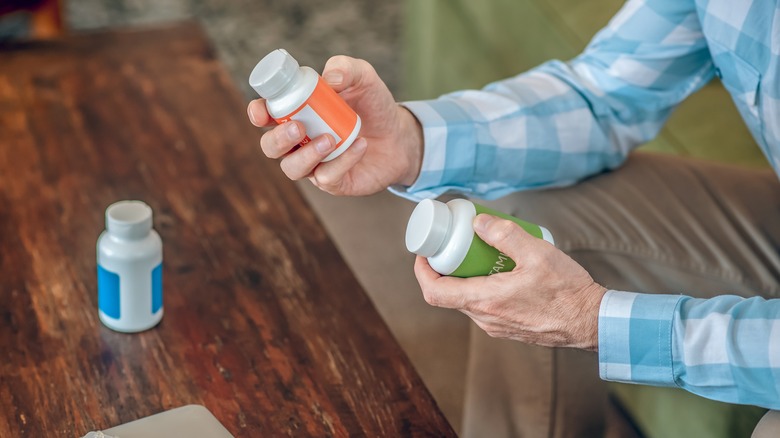The Best Multivitamins For Men Over 50
Getting the right amount of vitamins and minerals from food can be difficult if your diet isn't as healthy as you'd like it to be. Your nutritional needs also change when you're over 50, and your body becomes less efficient at absorbing nutrients from food. You might also find your appetite wanes as you get older, so it could become harder for you to get essential vitamins such as vitamins D and B12 and minerals like magnesium and calcium through your diet.
Supplement companies have developed multivitamins that address the nutritional needs of older adults. These multivitamins are usually labeled "50+" or "silver" to distinguish them from others. Men also need slightly more of certain nutrients, so you'll want to find multivitamins tailored for men. Centrum Silver Men 50+ and One Daily Men's 50+ Multivitamin are two multivitamin options that are NSF Certified, which means they meet the health and safety standards set by the National Sanitation Foundation.
You could also consider two multivitamins that are USP Verified to ensure that the amount of an ingredient that's stated on the label is in the bottle. USP Verified products are also safety-tested. Nature Made Multi for Him 50+ and Kirkland's Signature (distributed by Costco) are two USP Verified multivitamins for men over 50. In choosing the best multivitamin among these, there are a few things to consider.
What to consider in a multivitamin
Your doctor can test for any specific nutritional deficiencies to see if you need to take a supplement. You should also tell your doctor if you're taking a multivitamin to see if your medications interact with supplements. For example, a vitamin D supplement can affect cholesterol-lowering medications, and some weight loss drugs can inhibit vitamin D absorption. Vitamin K can reduce the effectiveness of the blood thinner warfarin. That's why you won't find 100% of your daily recommended vitamin K in some of these multivitamins.
Some multivitamins will load up on certain nutrients, but the National Institutes of Health advises against taking these megadoses of vitamins and minerals. You could be paying for more of these nutrients than you need, and some can be harmful. Although men over 50 need 1,000 milligrams of calcium, avoid taking more than 2,000 milligrams. Taking more than 100 micrograms of vitamin D can cause dehydration, nausea, or confusion. Some of the multivitamins mentioned have lower amounts of calcium and vitamin D.
The only vitamin you don't have to worry about overdosing is vitamin B12. According to the AARP, as many as 43% of older adults have a vitamin B12 deficiency, which can lead to nerve or balance issues, depression, or symptoms of dementia. In all four multivitamins recommended above, you'll find 10 times more vitamin B12 than what's needed.
Does a multivitamin help people over 50?
Because supplements aren't regulated by the Food and Drug Administration, they're limited in some of their claims on the label. For example, they can't promise that a multivitamin or supplement can treat certain conditions. You'll find that some will say the product "supports" a particular health benefit, such as your immune system. A 2020 study in Nutrients had a group of healthy adults over 55 take a multivitamin designated to support immune function. After 12 weeks, the people said they felt better, but their immune function didn't improve. Taking a multivitamin doesn't reduce your risk of early death.
Centrum Silver Men 50+ says it supports heart, brain, eye health, and muscle function. Yet Centrum Silver was used in a 2022 study in Alzheimer's & Dementia to see if this multivitamin can affect cognitive function. Taking a multivitamin for three years improved global cognitive function, memory, and executive function (the ability to focus and plan).
Supplements often have antioxidants that help the body ward off oxidative stress. In a 2015 article in the Journal of Functional Foods, adults over 50 who took 6 grams of salmon oil every day for 16 weeks saw lower markers of oxidative stress. However, the addition of a multivitamin didn't make a significant impact on oxidative stress.



